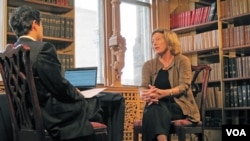The United States needs to change its approach to North Korea to effectively deal with Pyongyang’s growing nuclear threat, a former U.S. envoy said.
Earlier this month, Pyongyang conducted its fourth nuclear test in what it claimed was a successful test of a hydrogen bomb. While the United States and its allies questioned whether North Korea tested such a weapon, many experts appear to agree Pyongyang is continuing efforts to enhance its nuclear capability.
Kathleen Stephens, former U.S. ambassador to South Korea during the first Obama administration, told VOA Monday that Washington should enhance efforts to counter the North Korean threat, while maintaining a strong alliance with regional allies.
Enhanced effort needed
“I don’t think this is the situation where the status quo is something that is acceptable,” Stephens said when asked if the Obama administration’s containment policy of “strategic patience” should be continued. “We do see with this fourth test a need for redoubled effort,” she added.
The former diplomat, however, acknowledged Pyongyang’s apparent unwillingness to abandon nuclear development, saying Pyongyang often blocked diplomatic efforts toward denuclearization.
“We were certainly hoping we would be able to continue the works that have been done through the six-party talks to implement the 2005 Joint Statement of Principles,” said the envoy, referring to Pyongyang’s second nuclear test in May 2009.
With the latest test, the denuclearization effort has become more difficult, according to the ambassador.
Extent of sanctions unclear
On Wednesday, Washington and Beijing agreed on the need for new U.N. sanctions, but appeared to disagree on the extent of the action against Pyongyang.
“I think that what was important today is I heard from the foreign minister a commitment clearly to passing a resolution and make it strong, and adhere to the last resolution,” U.S. Secretary of State John Kerry told reporters in Beijing after meeting with China’s Foreign Minister Wang Yi.
“It’s important that we pass a new U.N. Security Council resolution on this issue for consultation. At the same time, sanctions are not an end in themselves,” said Wang.
North Korea has been at odds with the international community over its nuclear development since the early 1990s. The multi-state talks involving the United States, China, Russia, Japan and two Koreas have remained stalled since December 2008.
Envoy: Status Quo on North Korea 'Unacceptable'





